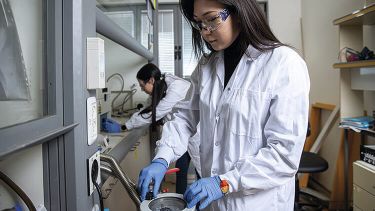
Cyber security is a growing area of concern and development. Tel Aviv University is at the forefront of research in this field
As the world becomes more digitized, so too it becomes more hackable. Cyber attacks, data breaches and even cyber warfare are real threats: understanding how hackers think and act is essential if we’re to fight back.
This is why cyber security is a quickly growing sphere. There’s an increasing demand for workers with knowledge in the field, with many companies now requesting formal training from their employees. Israel is one of the global centers of cyber leadership in strategy and technology, and Tel Aviv University (TAU) is part of this success, with its world-leading researchers and centers at the forefront of this national effort.
At the same time, Israel is also hard at work promoting digital learning. A country-wide initiative is enriching general, academic and professional education by bridging learning with the digital age. This is especially needed now as, due to the Covid-19 outbreak and the transition to online classes, there has been an increase in enrollment from students around the world.
Once again, TAU is playing its part with TAU Online – Innovative Learning Center. Working to adapt the university’s pedagogical vision to the digital age, the Center has launched a variety of initiatives designed to make education more accessible, including new online courses open to both Israeli and international students. “The digital revolution impacts and remodels almost every aspect of our lives, and higher education systems are no exception,” explains Yuval Shraibman, CEO of TAU Online – Innovative Learning Center.
These frameworks are now being combined and put to use to further advance cyber security.
Digital tools to combat cyber threats
Among other initiatives, TAU has pioneered a new Cyber Security online course, which aims to disseminate the information and tools necessary to combat and prevent cyber threats worldwide
— and whose instructors were 2020 edX Prize finalists. It provides students and researchers with an understanding of cryptography, cyber security and attacks and defence in the virtual world, as well as familiarity with viruses and malignant computer programs. “The online course takes the knowledge that, in the past, we taught only to computer engineering students at TAU and makes it accessible to learners outside academic institutions worldwide,” says Prof Avishai Wool, from the School of Electrical Engineering, who worked on developing the project.
Since its release, more than 16,000 students from 150 countries have enrolled, with hundreds of new people joining every week. “Students around the world want to study the most
up-to-date and relevant courses,” says Schraibman. “Israel is seen as a cyber superpower, so the course attracts many young people who want to study cyber security.”
The online course is part of an extensive cyber security curriculum, including the new international MA degree in Cyber Politics and Government, which welcomed its first cohort in the fall of 2020.
Prof Eviatar Matania, head of MA programs in Security Studies as well as Cyber Politics and Government, notes: “Israel is a small country that built a unique cyber-digital ecosystem and became one of the global powers in that field.”
TAU ranked 19th in the world for citation impact per faculty member in the 2020 QS Rankings













